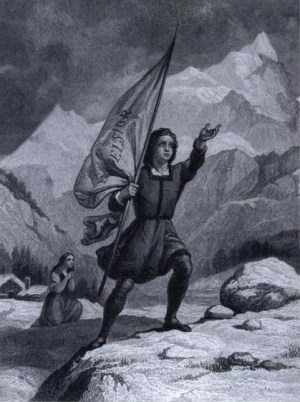< Previous |
Index |
Next > |
Up'ards
by Marriott Edgar (1935)
Illustrations by John Hassall
This poem is the Northern English flat-cap answer to the poem 'Excelsior!', which was written by the 19th century American poet Henry Wadsworth Longfellow.
The word 'excelsior' is Latin, meaning 'superior'. Its translation into Northern English is Up'ards.
(Up'ards is also the name of a team which plays an ancient version of football on Shrove Tuesday and Ash Wednesday in Ashbourne, Derbyshire, hence the question in the third verse regarding football.)
The original 'Excelsior!' is reproduced at the bottom of this page for comparison, followed by some more ups and downs.
The word 'clough' in this monologue is Northern English for a steep valley or ravine.
And if you're like myself and forget whether it should be "upwards" or "upward", "downwards" or "downward", etc. for British English or American English, this (British English) monologues's title should help you to remember.
'Twere getting dusk, one winter's night,
When up the clough there came in sight,
A lad who carried through the snow,
A banner with this 'ere motto...
'Uppards'
His face was glum as he did pass,
His eyes were shiny... just like glass,
And as he went upon his way,
He nobbut this 'ere word did say...
'Uppards'
And people sitting down to tea,
They heard him plain, as plain can be,
They thowt 'twere final football score,
As this 'ere word rang out once more...
'Uppards'
A policeman on his lonely beat,
He stopped the lad up t' end of t' street,
He said, "Where't going wi' that theer?"
The lad just whispered in his ear...
'Uppards'

"Don't go down t' clough." the policeman said,
"It's mucky road for thee to tread,
Canal's at bottom... deep and wide."
"That's not my road." the lad replied,
It's... 'Uppards'
A young lass stopped him further up,
She said "Come in wi' me, and sup."
He said, "I'm takin none o' yon,
Besides... I must be getting on...
'Uppards'"
Next day some lads had just begun,
To tak' their whippets for a run,
When dogs got scratching in the snow,
And found flag with this 'ere motto...
'Uppards'

That set them digging all around,
And 'twasn't long before they found,
A lad whose name they never learned,
Whose face was white, whose toes had turned...
'Uppards'
'Twas very plain for to behold,
The lad had ta'en his death o' cold,
He'd got his feet wet early on,
And from his feet the cold had gone...
'Uppards'
This story only goes to show,
That when the fields is white wi' snow,
It's inadvisable to go...
'Uppards'
EXCELSIOR
by
Henry Wadsworth Longfellow (1841)

Excelsior!
The shades of night were falling fast,
As through an Alpine village passed
A youth, who bore, 'mid snow and ice,
A banner with the strange device
Excelsior!
His brow was sad; his eye beneath,
Flashed like a faulchion from its sheath,
And like a silver clarion rung
The accents of that unknown tongue,
Excelsior!
In happy homes he saw the light
Of household fires gleam warm and bright;
Above, the spectral glaciers shone,
And from his lips escaped a groan,
Excelsior!
"Try not the Pass!" the old man said;
"Dark lowers the tempest overhead,
The roaring torrent is deep and wide!"
And loud that clarion voice replied,
Excelsior!
"O stay," the maiden said, "and rest
Thy weary head upon this breast!"
A tear stood in his bright blue eye,
But still he answered, with a sigh,
Excelsior!
"Beware the pine-tree's withered branch!
Beware the awful avalanche!"
This was the peasant's last Good-night,
A voice replied, far up the height,
Excelsior!
At break of day, as heavenward
The pious monks of Saint Bernard
Uttered the oft-repeated prayer,
A voice cried through the startled air
Excelsior!
A traveller, by the faithful hound,
Half-buried in the snow was found,
Still grasping in his hand of ice
That banner with the strange device
Excelsior!
There in the twilight cold and gray,
Lifeless, but beautiful, he lay,
And from the sky, serene and far,
A voice fell, like a falling star,
Excelsior!
What's up?
It's easy to understand up, meaning toward the sky or at the top of the list, but when we awaken in the morning, why do we wake up? At a meeting, why does a topic come up? Why do we speak up and why are the officers up for election and why is it up to the secretary to write up a report?
We call up friends and we use the word to brighten up a room, polish up the silver, warm up the leftovers and clean up the kitchen. We lock up the house and some guys fix up the old car.
Impatient people who don't line up for tickets stir up trouble. We can work up an appetite and think up excuses. To be dressed is one thing but to be dressed up is special.
And up can mean not up, and vice versa. Quite befuddling: A drain must be opened up because it's stopped up. We open up a store in the morning and close it up at night.
We seem to be pretty mixed up and messed up about up! To be knowledgeable about the proper uses of up, look up the word in a dictionary, where it can take up 1/4 of the page and can add up to about thirty definitions. If you are up to it, you might try building up a list of the many ways up is used. It will take up a lot of your time, but if you don't give up, you may wind up with a hundred or more.
Americans (especially) like to up things; saddle up and then gee-up, shape up and toughen up, all used to give those lacking normal machismo the ability to man up.
When it threatens to rain, we say it's clouding up. After rain, the sun starts to come out we say it is clearing up and wet things dry up.
(Interesting that slow down means the same as slow up, which goes to show that both down and up are often superfluous. It's up to you, but if you care to read up this page again, size it up and omit most of the ups, making no difference in the meaning.)
One could go on and on, but I'll wrap it up, for now my time is up, so I'll shut up.
| privacy policy | © seiyaku |